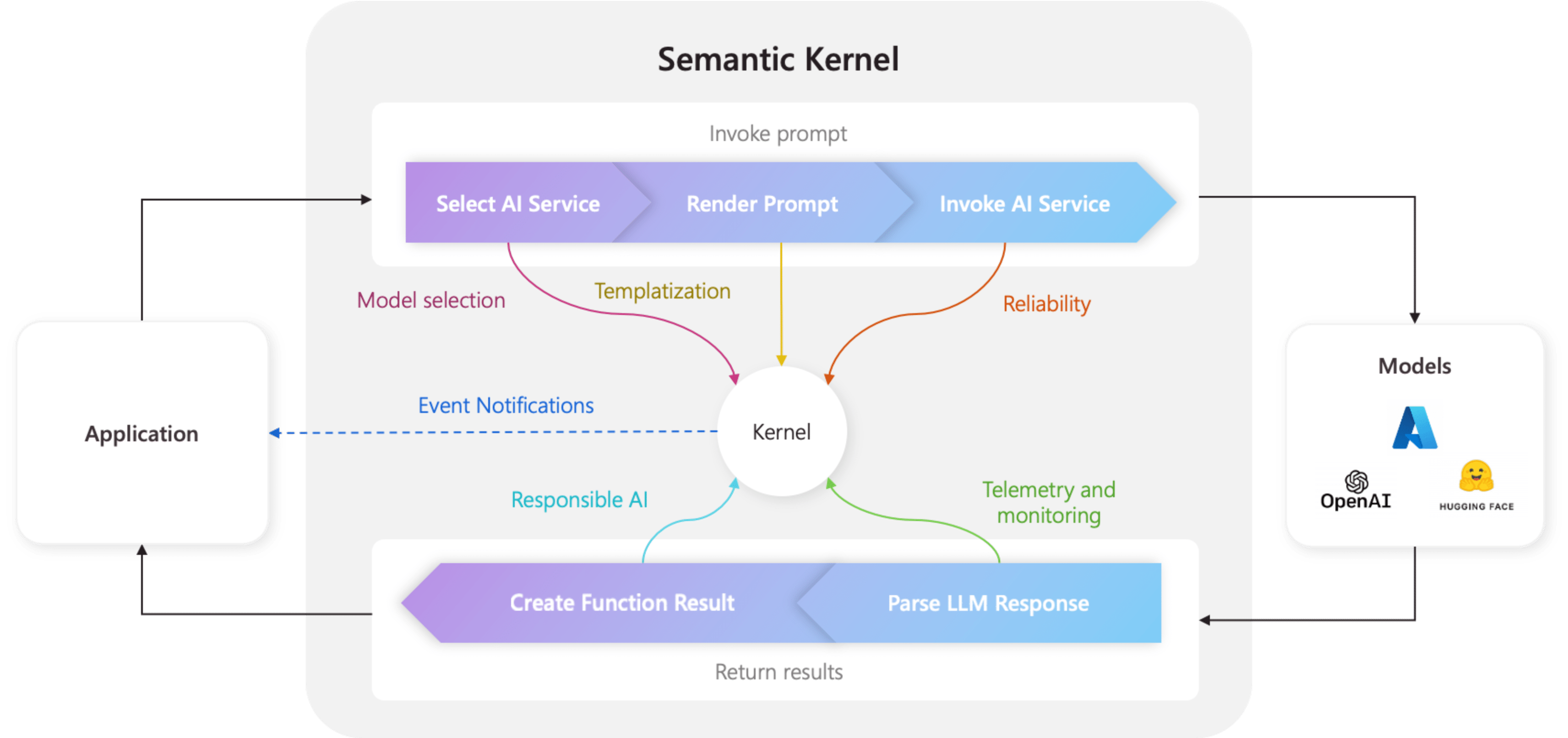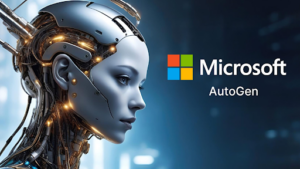What is a Microsoft Semantic Kernel?
The Microsoft Semantic Kernel (MSK) is an open-source tool that helps developers use the power of Large Language Models (LLMs) in their applications. By integrating MSK, developers can effortlessly create intelligent and responsive applications as it serves as an efficient middleware.
Key features include:
- Easy to Extend: You can add features using plugins and APIs.
- Smart Workflows: It allows for workflows that use memory to give quick, real-time responses.
- Combining AI Skills: It merges AI knowledge with procedural code for better results.
What is a Kernel?
The kernel is the heart of Microsoft Semantic Kernel. It acts as a simple manager that brings together all the tools and services your AI application needs to work. Whether it’s connecting to AI models, logging information, or fetching data, the kernel handles it all in one place.
For example, if you ask the AI to do something, the kernel:
- Pick the best AI service for the task.
- Prepares the request.
- Sends it to the AI.
- Gets the response.
- Send the result back to your app.
This setup makes it easy to build, control, and monitor your AI applications, ensuring everything runs smoothly and responsibly.

Adding AI services to Semantic Kernel
Semantic Kernel makes it easy to use different AI services in your application. You can quickly switch between services to see which one works best for your needs. It supports tasks like chat completion, text generation, and creating embeddings, as well as experimental features like turning text into images or audio. These services work with languages like C#, Python, and Java, making it simple for developers to build flexible and powerful AI applications.
Planning in Semantic Kernel
In Semantic Kernel, a plan is a strategy that helps your AI agent use multiple plugins together to solve a user’s request. It uses function calling, a feature where the AI selects and calls the right functions with the required parameters. For example, if a user asks to toggle lights, the AI can plan the steps: identify light states, decide actions, and execute them in sequence or parallel.

Planning simplifies complex tasks by automating this process, creating a loop where the AI calls functions, checks results, and decides the next steps. This makes building and managing AI applications more efficient and allows developers to focus on solving user needs without manually handling every step.
Key Capabilities of Microsoft Semantic Kernel
- Managing AI Skills and Plugins
MSK lets developers create “skills” for their AI models. These skills can summarize documents, generate text, or extract data. Developers can combine these skills to build powerful applications for multiple tasks. - Memory Integration
MSK is different from traditional AI models because it has a memory that helps it remember past interactions. This means it can create more personalized experiences by keeping conversations relevant over time. - Interoperability with Programming Languages
MSK works with popular programming languages like C# and Python. This allows developers to add AI capabilities to their existing technology easily. - Open-Source Ecosystem
Since MSK is open-source, it encourages teamwork and new ideas, allowing developers to add plugins, share solutions, and enhance its use.
Use Cases of Microsoft Semantic Kernel
- Customer Support Systems: Use smart chatbots that give clear answers based on user questions and past interactions.
- Knowledge Management: Summarize and analyze large documents to find useful insights.
- Task Automation: Streamline work by combining tasks with AI to improve efficiency.
- Personalized Assistants: Create virtual assistants that remember what users like and adjust to their changing needs.
Benefits for Developers
- Easily integrate large language models (LLMs) with your current applications.
- Improve how your applications understand and respond to context.
- Save time with ready-made tools and reusable parts.
Challenges and Considerations
While MSK has great potential, developers should keep in mind the following points:
- 1. Ethical AI Practices: Handle sensitive data carefully.
- 2. Performance Overhead: Balance memory use with how the application performs in real-time.
- 3. Model Fine-Tuning: Regularly improve AI models to fit specific needs
Conclusion
Microsoft Semantic Kernel changes how we develop AI-powered applications. It provides a strong framework that combines traditional coding with intelligence from large language models (LLMs). This helps developers create smarter applications that understand their context better. As AI technology continues to grow, tools like MSK will play an essential role in shaping the future of intelligent software.

